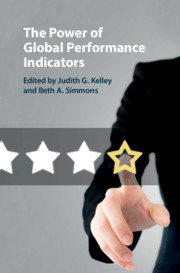Book contents
- The Power of Global Performance Indicators
- The Power of Global Performance Indicators
- Copyright page
- Contents
- Figures
- Tables
- Contributors
- Preface
- 1 Introduction
- Part I Ratings, Rankings, and Regulatory Behavior
- 2 The Power of Ranking
- 3 Blacklists, Market Enforcement, and the Global Regime to Combat Terrorist Financing
- 4 The Power of Indicators in Global Development Policy
- Part II The Normative Influence of Ratings and Rankings
- Part III Beyond and Within State
- Part IV Skeptical Voices
- Index
- Chapter 3: Appendices
- Chapter 4: Appendices
- Chapter 5: Appendix
- Chapter 6: Appendix
- Chapter 7: Appendix
- Chapter 8: Appendix
- Chapter 10: Appendix
- Chapter 11: Appendix
- Chapter 12: Appendix
- References
2 - The Power of Ranking
The Ease of Doing Business Indicator and Global Regulatory Behavior
from Part I - Ratings, Rankings, and Regulatory Behavior
Published online by Cambridge University Press: 28 February 2020
- The Power of Global Performance Indicators
- The Power of Global Performance Indicators
- Copyright page
- Contents
- Figures
- Tables
- Contributors
- Preface
- 1 Introduction
- Part I Ratings, Rankings, and Regulatory Behavior
- 2 The Power of Ranking
- 3 Blacklists, Market Enforcement, and the Global Regime to Combat Terrorist Financing
- 4 The Power of Indicators in Global Development Policy
- Part II The Normative Influence of Ratings and Rankings
- Part III Beyond and Within State
- Part IV Skeptical Voices
- Index
- Chapter 3: Appendices
- Chapter 4: Appendices
- Chapter 5: Appendix
- Chapter 6: Appendix
- Chapter 7: Appendix
- Chapter 8: Appendix
- Chapter 10: Appendix
- Chapter 11: Appendix
- Chapter 12: Appendix
- References
Summary
The World Bank has successfully marshaled the Ease of Doing Business (EDB) Index to amass considerable influence over business regulations worldwide. This success is notable given that the Bank has no explicit mandate over regulatory policy and that questions linger about EDB accuracy and the policy trade-offs a high ranking requires. First, this chapter shows that the EDB has a dominating market share among business climate indicators. Second, it uses media analyses and observational data to show that EDB has motivated state regulatory shifts. States respond to being publicly ranked and some restructure bureaucracies accordingly. Third, it explores plausible influence channels for the EDB ranking. It uses an experiment involving US portfolio managers to build on existing economics research and examine whether the rankings influence investor sentiment within the experiment. It also uses a case study of India’s multiyear interagency effort to rise in the EDB rankings to show how politicians see the ranking as affecting domestic politics, altering investor sentiment, and engaging bureaucratic reputation. Overall, a wide variety of evidence converges to illustrate the pressures through which the World Bank has used state rankings to achieve its vision of regulatory reform.
Keywords
- Type
- Chapter
- Information
- The Power of Global Performance Indicators , pp. 25 - 60Publisher: Cambridge University PressPrint publication year: 2020
References
- 5
- Cited by



